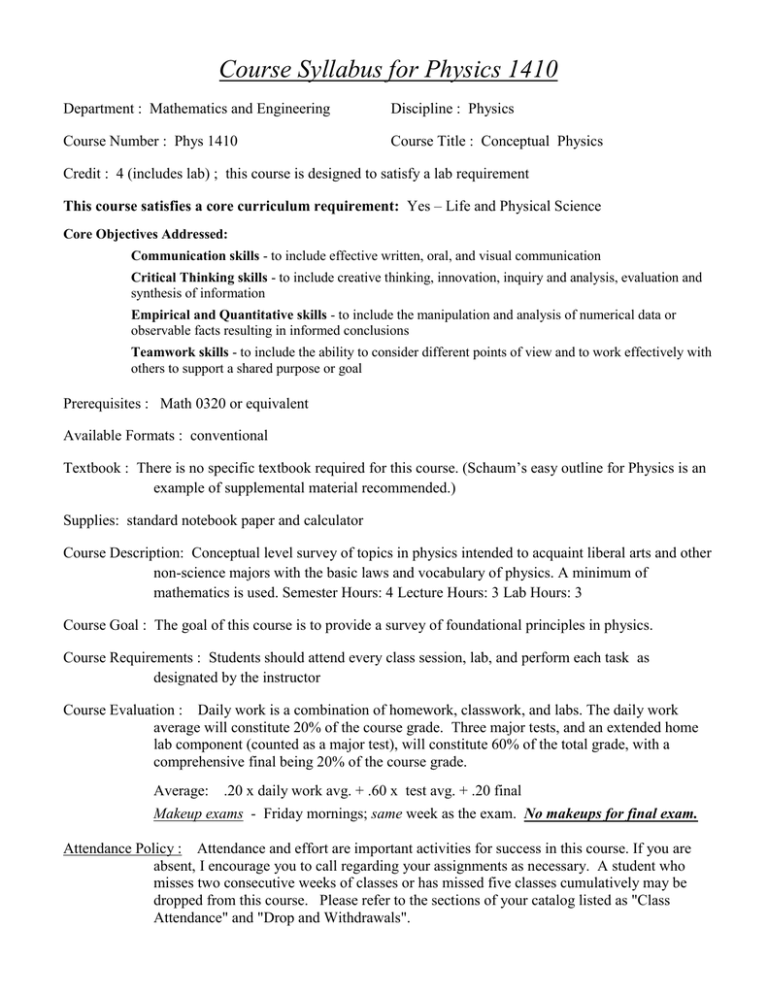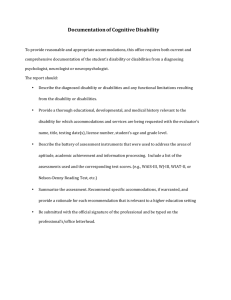Course Syllabus for Physics 1410
advertisement

Course Syllabus for Physics 1410 Department : Mathematics and Engineering Discipline : Physics Course Number : Phys 1410 Course Title : Conceptual Physics Credit : 4 (includes lab) ; this course is designed to satisfy a lab requirement This course satisfies a core curriculum requirement: Yes – Life and Physical Science Core Objectives Addressed: Communication skills - to include effective written, oral, and visual communication Critical Thinking skills - to include creative thinking, innovation, inquiry and analysis, evaluation and synthesis of information Empirical and Quantitative skills - to include the manipulation and analysis of numerical data or observable facts resulting in informed conclusions Teamwork skills - to include the ability to consider different points of view and to work effectively with others to support a shared purpose or goal Prerequisites : Math 0320 or equivalent Available Formats : conventional Textbook : There is no specific textbook required for this course. (Schaum’s easy outline for Physics is an example of supplemental material recommended.) Supplies: standard notebook paper and calculator Course Description: Conceptual level survey of topics in physics intended to acquaint liberal arts and other non-science majors with the basic laws and vocabulary of physics. A minimum of mathematics is used. Semester Hours: 4 Lecture Hours: 3 Lab Hours: 3 Course Goal : The goal of this course is to provide a survey of foundational principles in physics. Course Requirements : Students should attend every class session, lab, and perform each task as designated by the instructor Course Evaluation : Daily work is a combination of homework, classwork, and labs. The daily work average will constitute 20% of the course grade. Three major tests, and an extended home lab component (counted as a major test), will constitute 60% of the total grade, with a comprehensive final being 20% of the course grade. Average: .20 x daily work avg. + .60 x test avg. + .20 final Makeup exams - Friday mornings; same week as the exam. No makeups for final exam. Attendance Policy : Attendance and effort are important activities for success in this course. If you are absent, I encourage you to call regarding your assignments as necessary. A student who misses two consecutive weeks of classes or has missed five classes cumulatively may be dropped from this course. Please refer to the sections of your catalog listed as "Class Attendance" and "Drop and Withdrawals". Student Learning Outcomes/Competencies : 1. Classical physics: 1.1. 1.2. 1.3. 1.4. 1.5. 1.6. 1.7. 1.8. Identify parameters associated with linear motion (displacement, velocity, and acceleration). Apply Newton’s laws to physical problems and solve problems involving forces and work. Identify the different types of energy. Solve problems using principles of conservation of energy. Define and use the principles of impulse, momentum, and collisions. Discuss rotational kinematics and the relationship between linear and rotational motion. Introduce and demonstrate the First and Second Laws of Thermodynamics. Articulate and demonstrate the fundamental concepts of electricity and electromagnetism, electrostatic potential, potential difference, current, electrical resistance, magnetic field, and induction ; apply these concepts in electrical circuits. 1.9. Solve problems involving optics related to lenses, diffraction and refraction. 1.10. Describe the components of a wave and relate those components to light and sound. 2. Atomic Physics 2.1. Discuss the relationship between chemistry and atomic physics 2.2. Review of physical and chemical behavior of matter. 2.3. Simple introduction to quantum physics. 3. Geophysics and Astronomy 3.1 Discuss the relationship and application of physics in geology. 3.2 Discuss the relationship and application of physics in modern astronomy. I. Student Learning Outcomes/Competencies for Laboratory Work : 1. Prepare laboratory reports communicating information in a logical and scientific manner. 2. Conduct basic laboratory experiments following the basic scientific method. 3. Relate physical observations and measurements involving classical mechanics, thermodynamics, electricity and magnetism, optics, atomic physics and chemistry, and astronomy. 4. Evaluate the accuracy of physical measurements and potential sources of error in measurements. 5. Design/execute experiments involving principles of general physics, chemistry and astronomy. 6. Evaluate physical measurements and the potential sources of error in the measurements. 7. Identify useful sources of information for conducting experiments in areas of physical science. 8. Work effectively with others in coordinating and executing laboratory experiments. Equal Opportunity, Diversity, and Learning Environment : South Plains College strives to accommodate the individual needs of all students in order to enhance their opportunities for success in the context of a community college setting without regard to race, color, national origin, religion, gender, disability or age. Accordingly, students will be expected to conduct themselves in a respectful and orderly manner conducive with intellectual exchange in a positive learning environment. (This includes no food and drink, cell phones off, or no distracting behavior) ADA Accommodation: Students with disabilities, including but not limited to physical, psychiatric, or learning disabilities, who wish to request accommodations in this class should notify the Disability Services Office early in the semester so that the appropriate arrangements may be made. In accordance with federal law, a student requesting accommodations must provide acceptable documentation of his/her disability to the Disability Services Office. For more information, call or visit the Disability Services Office through the Guidance and Counseling Centers at Reese Center (Building 8) 7164606, or Levelland (Student Services Building) 716-2577. Note to students with disabilities: If you have a disability related need for reasonable academic adjustments in this course, provide the instructor with a letter of accommodation from the Disability Services Office. If you need immediate accommodations or physical access, please arrange to meet with the Disability Services Office before the next class meeting.




